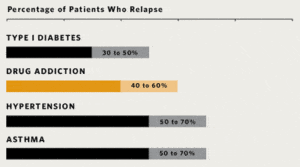For those seeking Bipolar treatment, there are many options. Unfortunately, many of these options are not effective for a long-term recovery plan.
Exploring the nature of bipolar disorder, bipolar treatment can be impeded by relapse.
Despite the risk of relapse, the condition is a serious medical condition that requires medical solutions and therapeutic solutions.
Genetic factors play a vital role in any medical or mental condition.
The right bipolar treatment can be found and better implemented, knowing all of the options and possible roads to recovery.
Before We Begin, Let’s Talk About The End : Relapse
As mental health awareness increases, so does the ability to treat common mental health conditions.
Bipolar treatment is often a combination of medications and therapy.
Unfortunately, because of the nature of this particular condition, it can be difficult to treat effectively.
Like bipolar disorder, there are many mental health conditions that are at a high risk of relapse. These chronic relapsing conditions can even be things like:
- Substance use disorder
- Eating disorders
- Diabetes
- Hypertension
- Asthma
When a mental health condition is looped into the same category as these other medical diagnoses, the reader’s perspective on relapse begins to change.
Relapse isn’t something to be afraid of or shameful about. It is a common behavior that happens with common conditions.
Having a plan for relapse makes these common occurrences manageable and keeps relapse from impeding recovery.
This is not meant to downplay a relapse, but to help gain perspective on the overall occurrences of them.
Relapse rates for drug-addicted patients are compared with those suffering from diabetes, hypertension, and asthma. Relapse is common and similar across these illnesses (as is adherence to medication). Thus, drug addiction should be treated like any other chronic illness, with relapse serving as a trigger for renewed intervention.
Source: McLellan et al., JAMA, 284:1689-1695, 2000.https://www.drugabuse.gov/publications/media-guide/science-drug-abuse-addiction-basics
Be proactive with the topic of relapse.
Have a plan, talk to your therapist or counselor about relapses and know what situations may trigger a relapse.
You can also read our article: 5 Tips for Relapse Prevention Plan.
Moods Changes In Relationship To Brain Chemicals
Chemicals in the brain are primarily responsible for our moods. When these chemicals are out of order, mood disorders like bipolar disorder can occur.
The combination of genetic and environmental factors are what contribute to most mental health conditions.
Much like a medical diagnosis, these mental health conditions are part of the health and normal functioning of our bodies.
Finding the right treatment for each individual’s unique blend of experiences and genetics is what makes for a successful recovery.
Genetics and Trauma Play a Role
Traumatic events in our lives also change our brain chemistry drastically.
When our brains experience trauma, our survival instincts kick in. This is a natural reaction to protect ourselves.
One cause for bipolar disorder symptoms are hormonal changes and traumatic events that cause excessive amounts of stress may trigger these hormonal changes as a survival reaction.
Childhood traumatic events are risk factors for developing bipolar disorders, in addition to a more severe clinical presentation over time (primarily an earlier age at onset and an increased risk of suicide attempt and substance misuse).
Childhood trauma leads to alterations of affect regulation, impulse control, and cognitive functioning that might decrease the ability to cope with later stressors.
https://journalbipolardisorders.springeropen.com/articles/10.1186/s40345-015-0042-0
Some genetics that we carry are not activated. Environmental factors and stress can trigger reactions that activate these genes and cause chemicals to become unbalanced.
These genes are called “epigenetic”. Most people are not experts in genetics. For a brief scientific explanation, here is a quote from the University of Utah’s Genetic Science Learning Center:
After birth and as life continues, a wider variety of environmental factors start to play a role in shaping the epigenome. Social interactions, physical activity, diet and other inputs generate signals that travel from cell to cell throughout the body.
As in early development, signals from within the body continue to be important for many processes, including physical growth and learning. Hormonal signals trigger big changes at puberty.
http://learn.genetics.utah.edu/content/epigenetics/memory/
Therapy Options for Bipolar Treatment
There are many sides to bipolar treatment.
The disorder in and of itself can be confusing, but the treatment doesn’t have to be.
There are different kinds of therapy that help those with bipolar disorder.
One treatment is Cognitive Behavioral Therapy. Cognitive Behavioral Therapy (CBT) is a form of therapy that involves talking and making goals to help aid in recovery. Dialectical Behavioral Therapy (DBT) has actually been proven to be very effective treating Borderline Personality Disorder (BPD). Dialectical Behavioral Therapy skills teach the same principles as Cognitive Behavioral Therapy, but it focuses on building skills that specifically help people with Borderline Personality Disorder.
Bipolar disorder and Borderline Personality Disorder are often confused for one another.
The two conditions have very similar symptoms and behaviors. Due to the similarity in their symptoms, Dialectical Behavioral Therapy may be very advantageous for bipolar treatment.
Finding A Solution
Substance abuse is often co-occurring with Borderline Personality Disorder and Bipolar disorder. Many people that suffer from both of these mental health conditions use drugs and alcohol to self-medicate.
Both of these conditions also have a higher risk of self-harm behaviors, risky behavior, and suicide. Finding bipolar treatment is even more important considering self-harm. Treatment can not only improve on happiness, but the right treatment can also save a life.
Mental health conditions are a sensitive topic in popular culture. It is important to stay educated and understand the realities surrounding them. Treatment can help drastically improve the well-being of those with bipolar disorder.
Finding the right treatment program for you or someone you love doesn’t have to be difficult.
Call our admissions team today and find out what options are available to you. With a residential treatment center or an outpatient treatment plan in place, the quality of life for those with mental health conditions and substance use disorders and improve.
There is hope, we can help : 888-358-8998.


